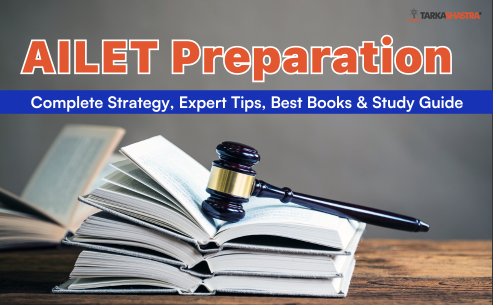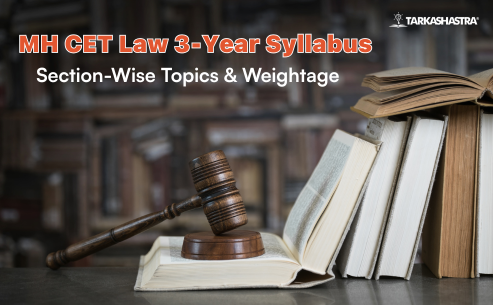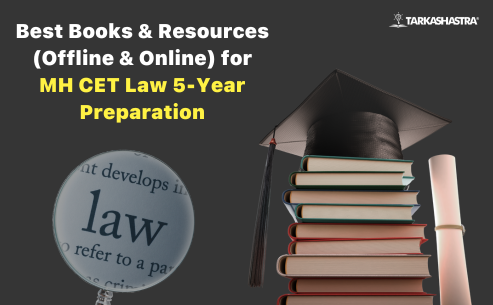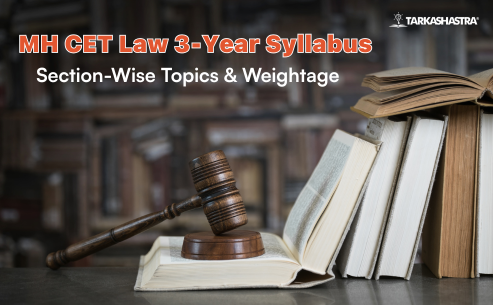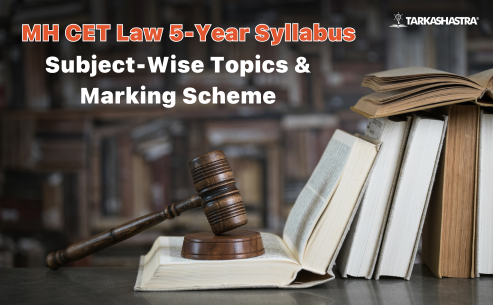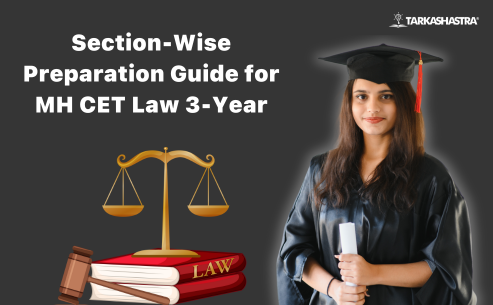When it comes to law entrance exams in India, the All India Law Entrance Test (AILET) stands apart. Conducted exclusively by National Law University, Delhi (NLU Delhi), this exam is the only gateway to one of the most prestigious law schools in the country. With just about 120 seats for BA LLB (Hons.) and around 81 for LLM, AILET is not just another test—it’s a high-stakes competition where every mark matters.
Unlike CLAT and other law exams, AILET has its own unique structure. Following the 2022 reforms, Mathematics was removed from the syllabus, shifting the spotlight entirely to English Language, Current Affairs & General Knowledge, and Logical Reasoning. This makes the exam heavily reasoning- and reading-intensive, testing not just what you know, but how sharply you can think under pressure.
For aspirants, this presents a crucial challenge: How can you prepare for AILET 2026 in a way that balances all three sections, maximises accuracy, and avoids negative marking? That’s precisely what this guide answers.
In the upcoming sections, you’ll find:
- Complete exam overview – structure, dates, weightage.
- Section-wise strategies – how to prepare English, GK, and Reasoning.
- Expert tips – time management, accuracy vs attempts, mock test planning.
- Recommended books & resources – including Tarkashastra’s curated study material.
- Study guide & timeline – for 6–9 months of preparation.
If your goal is NLU Delhi, then this blog is your roadmap—combining expert strategies with proven resources to help you crack AILET 2026.
AILET 2026 Exam Overview
The All India Law Entrance Test (AILET) 2026 is a national-level exam conducted exclusively by National Law University, Delhi (NLU Delhi). Unlike CLAT, which opens doors to multiple NLUs, AILET is held only for admission to NLU Delhi’s BA LLB (Hons.), LLM, and PhD programs. This makes the competition far more intense, with thousands of aspirants fighting for just a handful of seats.
The exam is designed to test your reading comprehension, reasoning ability, and awareness of current affairs—all crucial skills for a future lawyer. Since Mathematics has been removed post-2022, the focus is sharper on language, GK, and reasoning.
Here’s a quick snapshot of the AILET 2026 exam details:
| Particulars | Details (Expected 2026) |
| Exam Name | AILET (All India Law Entrance Test) |
| Conducting Body | National Law University (NLU Delhi) |
| Courses Offered | BA LLB (Hons.), LLM, PhD |
| Mode of Exam | Offline (Pen-and-Paper Based) |
| Duration | 120 minutes (2 hours) |
| Total Marks (UG) | 150 |
| Number of Questions | 150 (MCQs only) |
| Sections | English Language, Current Affairs & General Knowledge, Logical Reasoning |
| Marking Scheme | +1 for correct, –0.25 for wrong, 0 for unattempted |
| Medium of Exam | English |
Key Insight:
Unlike CLAT and other exams, AILET allocates nearly half the weightage (47%) to Logical Reasoning, making it the ultimate determinant of rank. Aspirants need to balance speed, accuracy, and strategy across all three sections to secure a top rank.
AILET 2026 Important Dates
Staying updated with the official schedule is the first step in your AILET 2026 preparation. Missing even a single deadline—be it the application form or admit card download—can cost you an entire year. The exam cycle typically begins in June 2025 with the release of the notification. It is expected to conclude by December 2025, with the declaration of results.
Here’s the revised schedule for AILET 2026:
| Event | Dates (Revised) |
| Release of AILET 2026 Notification | June 17, 2025 |
| Release of Revised Notification | July 22, 2025 |
| Start of Online Application Form | August 7, 2025 |
| Last Date to Submit Application Form | November 10, 2025 |
| Release of Admit Card | Third week of November 2025 |
| AILET 2026 Exam Date | December 14, 2025 (Revised) |
| Exam Timing | 2:00 PM – 4:00 PM |
| Release of Final Answer Key | Second week of December 2025 |
| Declaration of Results | Third week of December 2025 |
Key Insight:
With the exam scheduled for December 14, 2025, candidates will have a focused four-month preparation window after the application closes. This period must be used wisely for revision, mock tests, and performance analysis.
AILET 2026 Exam Pattern at a Glance
Before diving into preparation, it’s essential to understand the structure of the exam. The AILET 2026 is designed to evaluate candidates on three core areas: English proficiency, Current Affairs & General Knowledge, and Logical Reasoning.
Unlike CLAT, there is no Mathematics section, which means aspirants must focus their energy on reading comprehension, awareness, and reasoning ability. The 150 questions are all multiple-choice, with a negative marking scheme to discourage blind guessing.
Section-Wise Distribution of Questions & Marks (UG Exam)
| Section | No. of Questions | Marks | Weightage (%) |
| English Language | 50 | 50 | ~33% |
| Current Affairs & General Knowledge | 30 | 30 | ~20% |
| Logical Reasoning | 70 | 70 | ~47% |
| Total | 150 | 150 | 100% |
Marking Scheme
| Response Type | Marks Awarded |
| Correct Answer | +1 mark |
| Incorrect Answer | –0.25 mark |
| Unattempted | 0 mark |
Key Insights:
- Logical Reasoning is the ultimate rank-decider, carrying nearly half of the paper (47%).
- English acts as a stabiliser—strong vocab + comprehension can boost your overall score.
- GK & Current Affairs can be a quick rank-booster, as it takes less time in the exam.
Section-Wise Preparation Strategy
1. English Language
The English Language section of AILET 2026 tests more than just grammar rules or vocabulary. It’s designed to evaluate whether you can read, comprehend, and interpret information quickly—a vital skill for future law students.
This section consists of 50 questions (33% weightage), primarily dominated by Reading Comprehension (RCs), with grammar and vocabulary questions making up the rest.
Key Areas to Focus On
| Topic | What to Expect | Importance |
| Reading Comprehension | Passages with fact-based, inference-based, and tone-based questions | ⭐⭐⭐⭐⭐ (High) |
| Vocabulary | Synonyms, antonyms, idioms, one-word substitutions | ⭐⭐⭐⭐ (Moderate) |
| Grammar & Usage | Sentence correction, error spotting, fill in the blanks | ⭐⭐⭐⭐ (Moderate) |
| Para Jumbles | Rearranging jumbled sentences into a logical order | ⭐⭐⭐ (Low–Moderate) |
| Figures of Speech & Analogies | Similes, metaphors, contextual analogies | ⭐⭐ (Low) |
Question Types in English
- RC passages with inference and fact-based MCQs.
- Sentence correction and error spotting.
- Vocabulary-based questions (synonyms/antonyms/phrases).
- Para jumbles and sentence arrangement.
Preparation Strategy
- Read editorials & opinion pieces daily from The Hindu / Indian Express.
- Maintain a personal word bank of new words and revise it on a weekly basis.
- Practice mock RCs under timed conditions (5–7 minutes per passage).
- Revise basic grammar rules; focus on error spotting rather than shortcuts.
Expert Tips
- RCs are the backbone of this section → practice at least 2 passages daily.
- Vocabulary prep should be continuous—flashcards & revision apps help.
- Don’t waste too much time on para jumbles; attempt them only if you’re confident.
2. Current Affairs & General Knowledge
The GK & Current Affairs section of AILET 2026 carries 30 questions (~20% of the paper). While its weightage may seem small, this section can be a rank-booster because:
- It usually requires less time compared to English and Reasoning.
- Well-prepared candidates can secure almost all 30 marks in 10–15 minutes.
This section assesses both static knowledge (history, polity, geography, and economy) and dynamic awareness (current events, legal updates, government schemes, and international news).
Key Areas to Focus On
| Topic | What to Expect | Importance |
| Current Affairs (last 12–15 months) | National & international events, awards, policies, sports, economy | ⭐⭐⭐⭐⭐ (Very High) |
| Legal GK | Supreme Court judgments, constitutional amendments, bills & laws | ⭐⭐⭐⭐ (High) |
| Static GK | History, Polity, Geography, Economy, Environment | ⭐⭐⭐ (Moderate) |
| International Affairs | Summits, treaties, organizations, disputes | ⭐⭐⭐ (Moderate) |
| Miscellaneous | Books & authors, science & tech, ranks & reports | ⭐⭐ (Low–Moderate) |
Question Types
- MCQs on current national & international events.
- Legal GK questions (linking current affairs with law).
- Static GK (direct fact-based questions).
Preparation Strategy
- Dedicate 15–20 minutes daily to newspapers like The Hindu or Indian Express.
- Use monthly current affairs compendiums for revision.
- Track legal developments → SC/HC judgments, bills passed in Parliament.
- Revise static GK weekly using short notes.
Expert Tips
- GK is not about last-minute cramming → it needs consistent preparation.
- Prepare a timeline of events for the last 12–15 months.
- Keep quick notes for monthly revision before exam day.
- Since it’s a low-time section, finish it quickly in the exam and save time for Logical Reasoning.
3. Logical Reasoning (The Game-Changer)
With 70 questions (47% of the paper), Logical Reasoning is the rank-decider in AILET 2026. This section checks your ability to analyse patterns, solve puzzles, evaluate arguments, and think critically — precisely the kind of skills required in legal studies.
It has two major components: Analytical Reasoning and Critical Reasoning.
A. Analytical Reasoning (Problem-Solving)
| Topic | What to Expect | Difficulty Level |
| Puzzles & Arrangements | Seating (linear/circular), grouping, scheduling | ⭐⭐⭐⭐ Moderate–High |
| Series & Coding-Decoding | Number/letter patterns, symbol coding | ⭐⭐⭐ Easy–Moderate |
| Blood Relations | Family tree, coded relations | ⭐⭐ Easy |
| Direction Sense | Movement, distance, orientation | ⭐⭐ Easy |
| Ranking & Ordering | Position, order, hierarchy-based | ⭐⭐⭐ Moderate |
| Syllogisms & Venn Diagrams | Statement-based deductions | ⭐⭐⭐ Moderate |
B. Critical Reasoning (Argument Evaluation)
| Topic | What to Expect | Difficulty Level |
| Assumptions & Conclusions | Identify hidden assumptions, logical outcomes | ⭐⭐⭐⭐ Moderate–High |
| Strengthen/Weaken Arguments | Decide which statements support or undermine an argument | ⭐⭐⭐⭐ High |
| Cause & Effect | Logical implications & correlations | ⭐⭐⭐ Moderate |
| Statement & Inference | Drawing valid inferences | ⭐⭐⭐⭐ High |
| Assertion & Reason | Testing logical consistency | ⭐⭐⭐ Moderate |
| Critical Reading | RC-style passages requiring argument analysis | ⭐⭐⭐⭐ Moderate–High |
Question Types in Logical Reasoning
- Multi-step puzzles and seating arrangements.
- Cause-effect and assumption-based inference MCQs.
- Strengthen/Weaken questions linked to real-world or legal contexts.
- Syllogisms & statement-based logical deductions.
- Critical reading passages → blending RC with logical analysis.
Preparation Strategy
- Dedicate 50% of your prep time to reasoning.
- Practice puzzles, seating, and series daily with timed drills.
- Focus on Critical Reasoning, as it’s newer and trickier.
- Solve previous years’ AILET papers to identify recurring logic patterns.
- Attempt full-length mocks to build speed & stamina.
Expert Tips
- Analytical reasoning can be mastered with practice, but Critical reasoning requires conceptual clarity.
- Always read arguments carefully; the trap is usually in subtle wordplay.
- Practice at least 2–3 reasoning sets daily from past papers/mock tests.
- In the exam, attempt easy analytical questions first, then move to critical reasoning.
Expert Tips for AILET 2026
Preparing for AILET isn’t just about covering the syllabus—it’s about playing smart with strategy, time, and accuracy. With only 120 minutes to solve 150 questions, every second counts. Here are some proven tips from mentors and toppers:
1. Accuracy over Attempts
- Remember, AILET has negative marking (–0.25 per wrong answer).
- Four wrong answers = 1 full mark lost.
- It’s better to attempt 120 questions with 85% accuracy than all 150 with only 60% accuracy.
2. Time Management
- Don’t get stuck on any one question.
- Allocate time smartly across sections:
| Section | Ideal Time Allocation |
| English (50 Qs) | 30–35 minutes |
| GK & Current Affairs (30 Qs) | 10–15 minutes |
| Logical Reasoning (70 Qs) | 60–65 minutes |
| Review & Corrections | 5–10 minutes |
3. Mock Tests are Non-Negotiable
- Start with 1 mock/week → gradually increase to 3–4 mocks/week in the last 2 months.
- Always conduct post-mock analysis to identify which questions took extra time or caused errors.
- Replicate exam conditions → attempt mocks in the same 2–4 PM slot.
4. Learn the Art of Elimination
- For tricky MCQs, eliminate obviously wrong options to improve accuracy.
- This works exceptionally well in GK and Critical Reasoning questions.
5. Build Exam Stamina
- AILET is a 2-hour speed test. Practice sitting for full-length papers without breaks.
- Train your brain to stay sharp till the last minute—it often decides your final 5–10 marks.
6. Keep Revision Cycles
- Weekly revision for vocabulary, current affairs, and reasoning shortcuts.
- Maintain a mistake notebook → jot down common errors and revise before mocks.
Key Insight:
Toppers crack AILET not by attempting everything, but by maximising correct attempts and using time wisely. Discipline + consistency + smart strategy = NLU Delhi success.
Recommended Books & Resources for AILET 2026
Choosing the right resources is half the battle in AILET preparation. While the market is flooded with guides and GK yearbooks, the most innovative approach is to use streamlined, exam-specific material that covers exactly what the AILET tests — nothing more, nothing less.
Why Choosing the Right Books Matters
- Targeted Content: The appropriate books offer focused information that will enable you to complete the AILET syllabus successfully. You can ensure you’re concentrating on the proper subjects and question types by selecting books that follow the test format.
- Professional Advice: Many of the suggested publications are authored by seasoned teachers and subject-matter specialists. These offer insightful advice and practical methods for approaching the test methodically.
- Conceptual Clarity: By dissecting complex ideas into more manageable chunks, high-quality books help lay a solid foundation for understanding complex concepts. This guarantees that you have a thorough comprehension of the subjects, which is necessary to correctly answer exam issues.
- Opportunities for Practice: Reputable books offer a range of practice questions, including past years’ papers and simulated exams. This enables you to get acquainted with the pattern of the exam’s questions and evaluate your progress regularly.
- Learn Time management: It is frequently included in quality study materials, which will enable you to practice under time constraints. This is essential for increasing accuracy and speed, which can significantly impact the results of competitive tests.
- Boost Confidence: As you prepare, using books that are organised neatly can help you feel more confident. You will feel more prepared on test day if you have mastered every subject and practised frequently.
A. English Language
- Word Power Made Easy – Norman Lewis (for vocabulary building)
- High School English Grammar and Composition – Wren & Martin (for grammar fundamentals)
- Objective General English – S.P. Bakshi (for practice questions)
Tarkashastra Advantage:
Our AILET English e-book and hard copy book combine RCs, grammar drills, and vocabulary exercises in one place, modelled on actual AILET patterns.
B. Current Affairs & General Knowledge
- Lucent’s General Knowledge (for static GK)
- Manorama Yearbook (broad coverage of events)
- Pratiyogita Darpan / Competition Success Review (for factual CA)
Tarkashastra Advantage:
Instead of bulky yearbooks, students rely on Tarkashastra Current Affairs Monthly Compendium + Legal GK Digest, which focuses only on 12–15 months of relevant updates, judgments, and amendments that matter for AILET.
C. Logical Reasoning
- Analytical Reasoning – M.K. Pandey
- A Modern Approach to Logical Reasoning – R.S. Aggarwal
- Verbal & Non-Verbal Reasoning – R.S. Aggarwal (for practice sets)
Tarkashastra Advantage:
Our AILET Reasoning Module features topic-wise drills (puzzles, syllogisms, and critical reasoning) along with previous years’ solved AILET sets, helping aspirants master the exact question types asked in the exam.
D. Mocks, PYQs & Sectional Tests
- Solving previous years’ papers is non-negotiable.
- Full-length mocks are crucial to build speed & accuracy.
Tarkashastra Advantage:
- Full-Length AILET Mock Tests → designed to replicate the exam in difficulty, timing, and structure.
- AI-driven performance analytics → identifies weak spots instantly.
- Sectional & Topic-Wise Practice Sets → targeted improvement.
Final Word on Books:
While generic books help with fundamentals, Tarkashastra’s curated AILET material (e-Books, mocks, GK compendiums, and mentor-led classes) ensures aspirants don’t waste time on irrelevant topics. With competition, these intense, focused resources are your best ally.
Study Guide & Preparation Timeline
One of the biggest mistakes AILET aspirants make is preparing without a structured plan. With the exam scheduled for December 14, 2025, candidates get almost a year to prepare — but what matters is how you use those months smartly.
The ideal timeline for AILET prep can be divided into three phases (6–9 months strategy):
Phase 1: Foundation Building (Months 1–3)
- Focus on the basics of English grammar, vocab, and RCs.
- Start with static GK and build a daily newspaper habit.
- Practice Analytical Reasoning topics, such as series, syllogisms, and seating arrangements.
- Target: Cover the entire syllabus once.
Phase 2: Intensive Practice (Months 4–6)
- Move to Critical Reasoning (assumptions, strengthen/weaken).
- Revise current affairs of the last 12 months.
- Attempt weekly mocks + sectional tests.
- Build a personal error log to track mistakes.
Phase 3: Revision & Exam Conditioning (Months 7–9)
- Complete focus on mock tests under timed conditions.
- Daily GK revision using short notes & monthly compendiums.
- Strengthen weak areas identified in mocks.
- Practice 2 RCs + 2 reasoning sets daily.
- Target: Simulate exam day conditions (2–4 PM).
Sample Daily Routine for AILET Aspirants
| Time | Activity |
| 6:30 – 7:30 AM | Reading newspaper (The Hindu / Indian Express) + Current Affairs notes |
| 10:00 – 11:00 AM | English practice (RCs, vocab, grammar drills) |
| 11:30 – 1:30 PM | Logical Reasoning (puzzles, critical reasoning) |
| 3:00 – 4:00 PM | GK revision (static + legal GK) |
| 5:00 – 7:00 PM | Mock test / sectional test practice |
| 8:00 – 9:00 PM | Mock analysis & error log update |
| Night (15 mins) | Flashcard revision (vocabulary & GK quick facts) |
Key Insight:
Consistency beats intensity. Even 3–4 hours of daily practice for 6–9 months, combined with structured revision and mock tests, can help secure a top rank in AILET 2026.
Conclusion
The AILET 2026 journey is not just about studying harder, but about preparing smarter. With Logical Reasoning carrying nearly half the paper, English ensuring stability, and GK acting as a quick booster, success depends on a balanced, disciplined strategy.
What separates toppers from the rest is not just knowledge, but consistent practice, accuracy, and time management. Avoiding common mistakes, sticking to a structured study plan, and analysing mock tests regularly will give you a decisive edge.
At Tarkashastra, we simplify this process for you with:
- Expert-curated AILET e-Books & hard copy study material (English, GK & Reasoning).
- Full-length mock tests and sectional practice sets that replicate AILET’s latest pattern.
- AI-driven performance analytics to identify strengths and weaknesses.
- Mentor-led sessions with proven strategies tailored to NLU Delhi’s entrance.
With the proper guidance, securing a seat at NLU Delhi is not a dream — it’s an achievable goal.
Start your AILET 2026 preparation with Tarkashastra today and take the first step towards your law career.
FAQs on AILET Preparation 2026
- What is the AILET 2026 exam date?
AILET 2026 will be conducted on December 14, 2025, in offline mode. The exam will be held from 2:00 PM to 4:00 PM by NLU Delhi.
- How many seats are offered through AILET 2026?
NLU Delhi offers around 120 seats for BA LLB (Hons.) and 81 seats for LLM through AILET 2026, making it one of the most competitive law entrance exams.
- What is the exam pattern of AILET 2026?
AILET 2026 will have 150 MCQs divided into three sections—English Language (50 Qs), Current Affairs & GK (30 Qs), and Logical Reasoning (70 Qs). Each correct answer gives +1 mark, and each wrong answer deducts -0.25.
- Which section is most important in AILET 2026?
Logical Reasoning is the most crucial section, carrying 70 questions (47% weightage), making it the ultimate rank-decider in AILET 2026.
- Has Mathematics been removed from AILET?
Yes, after the 2022 reforms, the Mathematics section was removed. The focus is now on English, GK, and Logical Reasoning.
- How much time should I allocate per section in AILET 2026?
Experts recommend: English – 30–35 minutes, GK – 10–15 minutes, Logical Reasoning – 60–65 minutes, and 5–10 minutes for review.
- What are the best books for AILET 2026 English preparation?
Some top resources include Word Power Made Easy (Norman Lewis), Wren & Martin Grammar, and Tarkashastra’s AILET English e-book and hard copy for targeted practice.
- How should I prepare for Current Affairs for AILET 2026?
Focus on the last 12–15 months of events, Supreme Court judgments, bills, and amendments. Use Tarkashastra’s Monthly Compendium & Legal GK Digest for concise coverage.
- What is the role of mock tests in AILET preparation?
Mock tests are non-negotiable. Start with one mock per week, then increase to three to four per week before the exam. Always analyse mistakes to improve accuracy.
- How to avoid negative marking in AILET 2026?
Avoid blind guessing. Use elimination techniques, attempt only when 50% confident, and prioritise accuracy over attempts.
- Is GK in AILET scoring?
Yes, GK can be a quick rank-booster as it requires less time. Well-prepared candidates can attempt all 30 GK questions in 10–15 minutes.
- How long does it take to prepare for AILET 2026?
A structured 6–9 month preparation plan with daily practice of English, Reasoning, and GK, along with regular mock tests, is sufficient to crack AILET 2026.

